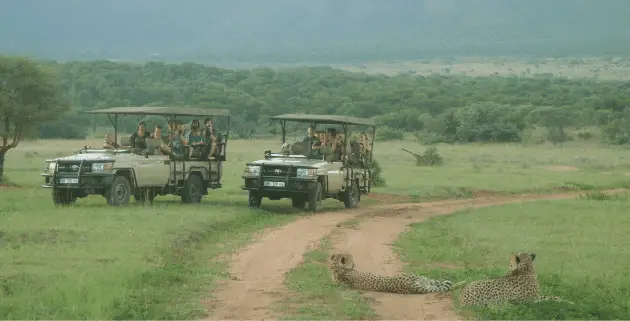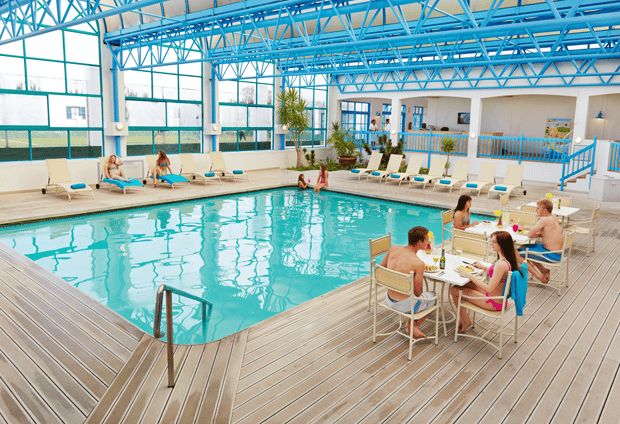Property Review – Ubizane
Ubizane – The Place of Calling
Ubizane Wildlife Reserve in South Africa lives up to its isiZulu name as a place that invokes natures call to experience her abundance of flora and fauna – natural assets that are as unique to this far Northern region of KwaZulu-Natal as her people who inhabit the Zululand territory, writes Des Langkilde.
The Zulu word ‘bizane’ can also mean (to) ‘be expensive’, which is certainly not the case when comparing the accommodation rates of the game reserve’s two lodges to other safari lodges in Hluhluwe’s bush veld area. To my mind, a more appropriate name for the reserve may have been Umkhanyakude, as Fever Trees (Acacia xanthophloea) are a predominant feature.

Zululand Tree Lodge serves as the reception area on arrival where ample parking is provided under the expansive shade of Acacia trees. A well-maintained dirt road leads guests on arrival from Ubizane’s imposing entrance gate to the circular parking area at reception, which caters for tour coaches.

From the modest reception area, board-walks lead over water features where resident Vine snakes (thelotornis capensis capensis) and the occasional African Rock Python prey on frogs and stocked Tilapia fish, to the communal pool area, bar and dining deck, which afford scenic views over a Fever Tree forest where antelope graze and an abundance of birdlife can be spotted.
On both sides of the main lodge, paved pathways lead to 24 spacious wood and thatch rooms, each built on elevated stilts with bedrooms that lead onto private viewing decks, affording guests secluded tranquility facing the Fever Tree forest. Each air-conditioned room has an en-suite bathroom with shower and a dressing room, coffee/tea making facilities, bar fridge and mosquito nets, all of which combine to provide subtle hints of luxury while still maintaining a relaxing bush safari atmosphere.
Buffet breakfasts are served until 10h00 in the lodge’s restaurant, as is ‘high-tea’ which is served at 14h00 and consists of soup, home made breads, scones, ‘health’ wraps and refreshments. Dinners are served at 19h00 at alternate venues depending on weather conditions – either the restaurant, the traditional safari style Boma area or at one of several Bush dinner sites. The sumptuous cuisine is prepared with originality under the watchful eye of resident chef Martin Beylefeld, who discovered his latent flair for cooking after a career in the IT sector and is entirely self-taught (although I suspect that the long-serving kitchen staff have guided his culinary experience).

Special occasions, such as weddings, honeymoons, birthdays or wedding anniversaries are catered for in up-market bush style and made all the more memorable by the passionate attention to detail of Ubizane staff.
Conferences and corporate business meetings are catered for at a newly erected conference centre, which is fitted with air-conditioning, trestle tables and comfortable seating. The wood under thatch centre is also equipped with a coffee and water station as well as ablutions. Seating configurations can accommodate up to 70 delegates depending on the seating style and pre-paid WiFi bundles can be purchased from reception, although I found the connectivity to be sporadic.
Zululand Safari Lodge is located within walking distance of the Tree Lodge and provides self-catering accommodation in 14 Standard (two-sleeper) and 11 Family (four-sleeper) rondavel (bungalow) styled rooms. Each unit has a fully equipped kitchen with crockery and cutlery varying depending on the number of guests per room.

Each room has a veranda from which guests can view the grazing antelope who frequent a watering hole located below the gently sloping lodge complex. A swimming pool, children’s play area and communal hall with television, billiards table and a communal style boma braai area at the back complete the facilities at this lodge.
Game Drives
The privately owned Ubizane Game Reserve covers 1200 hectares and like the nearby state-run Hluhluwe–iMfolozi Park, the hilly terrain consists primarily of grasslands, which extend into acacia Savannah and woodlands. Ubizane’s fauna includes a diverse range of species, including jackal, blue wildebeest, giraffe, zebra, nyala, kudu, impala, duiker, reedbuck, warthog, mongoose, monkeys and a variety of tortoises, terrapins, snakes and lizards. Spotted hyena are sometimes spotted in the reserve but they are temporary visitors that come in from neighbouring lands, as they utilize warthog holes burrowed beneath perimeter fences to enter and exit the property.

The reserve is a prime birding destination and is home to 500 bird species. Bird life includes Night Heron, Wood Stork, Wahlberg’s Eagle, Shelley’s Francolin, Black-bellied Korhaan, Temminck’s Courser, Klaas’s Cuckoo, Little Bee-eater and Crested Barbet.
Game drives and walking safari tours are led by Ubizane’s resident guide Hamilton Phita, a registered FGASA field guide, who has worked at the reserve for over twenty years and takes obvious pleasure in sharing his wealth of knowledge on the indigenous flora and fauna, liberally interspersed with local folk lore and medicinal uses of most plant species.

Game drives are also conducted within the Hluhluwe Park itself. For passionate twitchers (birdwatchers), the Hluhluwe River Flood Plain is one of the only areas in the whole of South Africa where Yellow-throated, Pink-throated and Orange-throated Longclaw species can be seen together.

Conservation
To date, they have managed to clear and control over 350 hectares of chromolina, 100 hectares of sickle bush, as well as erosion control all over the property. They have successfully rehabilitated and released a young orphaned warthog, named Tiban that was well followed on the blog and Facebook, they are currently raising young barn owls that were abandoned, and their overall populations of animals have climbed very successfully over the last three years of taking over the farm. Bird sightings have actually been recorded for over 500 species and there is a massive increase in raptor sightings on the reserve, which is always a good sign.
As with any other game reserve in Africa, poaching is always a concern as the reserve is surrounded by tribal community homesteads whose residents breach the reserve’s electrified fencing on a regular basis in search of bush meat for subsistence or commercial purposes. “This is an of aspect of any game reserve that will never be completely eradicated,” says Tiaan Pienaar, who manages the conservation and anti-poaching side of Ubizane reserve. “However, in the last three years we have managed to reduce the number of poaching and snaring incidences by over 80 per percent. Given that we are located right next to community land, this is an exceptional accomplishment. We have acquired a Weimeraner dog that I have personally trained for anti-poaching purposes, such as tracking trespassers who may enter the farm illegally. In addition, we constantly do patrols to search for and disarm wire snares and are in the process of building our very own anti-poaching unit that will be permanently based on the reserve 24/7.

Patrolling the reserves 17 kilometre boundary fence is certainly a 24/7 job, although Tiaan notes that the reserves Warthogs tend to avoid burrowing under the section of fencing that borders the community lands, which makes it easier to spot where poachers have gained entry. An early warning system has made breach detection easier, as the electrified fencing is fitted with sensors that relay a message to Tiaan’s cell phone whenever the fence is touched.
Detecting and apprehending poachers who trespass into the reserve is one thing but obtaining successful prosecutions for the offence is problematic. “The problem lies with the local police station, who incorrectly document the reported cases as ‘trespassing’ rather than ‘poaching’. To have a poacher successfully prosecuted, we have to catch the culprit with the animal carcass and weapons in hand, otherwise the court case is simply dropped” says Tiaan. “We are also faced with the potential risk of being arrested ourselves as poachers often claim that they were assaulted and lay charges against us.”
Community
While staff members reside in staff housing within the property, those I spoke to originate from outside of the Hlabisa magisterial district (Hluhluwe / Mtubatuba area). I asked Wayne Matthews, Lodge Manager at Ubizane, if the reserve has a community upliftment programme in place. “We do employ local residents from the surrounding community on a part-time basis and our permanent staff all get involved in proving training so that we have additional human resources available for when we host large groups, such as conferences or weddings. We also regularly bring in groups of forty to fifty local unskilled labourers to assist in weeding out invasive plants in the reserve, such as Cromalina and Lantana” said Wayne.
Veld fires are a continual hazard during the dry winter months and the Ubizane fire-fighting team are often called upon to help douse fires that threaten to burn community homes.
Environment
Recycling and energy efficiency are high priorities at any good safari lodge and Ubizane is no exception, as evidenced by the clearly labelled refuse bins outside the kitchen. “Paper, glass, tin and plastic are all separated and taken to a recycling depot. Left over food and vegetable peelings are fed to the resident Ostriches, while wet-waste is used for compost and bathroom ‘white’ water is re-used for garden irrigation. All rooms are also fitted with heat pumps to minimise geyser electricity usage and we use candle-light as much as possible in the restaurant and boma areas during evening meals,” said Wayne.
History

Ubizane Wildlife Reserve is arguably one of the oldest private wildlife reserves in the Hluhluwe area, with a history that spans more than 50 years. The property was originally bought from a local chief to be used as a cattle farm, after which it was converted to a hunting farm and eventually became an eco-tourism property in the late 1960’s.
The hills around Ubizane once served as a Zulu meeting site where the chiefs gathered to share their judgments and make significant decisions. At the summit of Ubizane (Zulu for Place of Calling), the Chiefs used to summon their people by beating drums and sounding huge Kudu horns. Ubizane Hill also served as a place from where communications were signalled across the valley to summon the various tribes.
Since taking over the property some three years ago, the owner Alan Burke has invested substantially in upgrading both the Tree Lodge and Safari Lodge rooms and amenities.
Ubizane Wildlife Reserve certainly provides discerning visitors who are looking for a memorable and luxurious safari experience, all that could be expected and the many reviews posted on TripAdvisor seem to concur.
To book email [email protected] or call +27 (0)35 562 1020 or visit: www.ubizane.co.za







